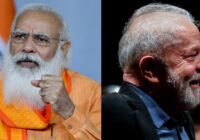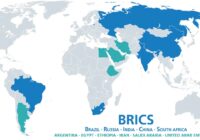Just as Mill believed that Indians did not deserve liberty, most affluent nations believe that Palestinians do not have the same rights to life, liberty and the pursuit of happiness.
Few remember that John Stuart Mill, the author of On Liberty, worked for the British East India Company from 1823 to 1858. Mill refused to subscribe to the 39 articles of the Church of England that were concocted after much turmoil under Elizabeth I. As a result, Mill could not study at Oxford or Cambridge and had to attend University College London instead. Yet even this nonconformist who waged war for liberty and women’s rights suffered from cognitive dissonance when it came to India and the colonies.
The company that paid Mill’s wages was ruling India to rob it. Mill’s employers taxed Indians extortionately and forced them to grow cash crops like opium. This was exported to China and, when the Chinese objected, the Royal Navy invaded the Middle Kingdom to uphold the principle of free trade. Mill’s paymasters brought famine to India and addiction to China. Yet Mill had the cheek to argue for “benevolent despotism” because only “human beings in the maturity of their faculties” deserved liberty.
Echoes of Mill can be heard across cities in Europe and the United States. The rights to life, liberty and the pursuit of happiness are the prerogatives of advanced peoples. Palestinians who are under the thrall of the Islamist Hamas movement and the corrupt Fatah party are not “in the maturity of their faculties.” Therefore, they have to be supervised by the Israeli military, robbed of their land by settlers and ignored by much of the affluent world that is terrified of the rise of radical Islam personified by the Islamic State (IS).
This week, an arson attack occurred on a Palestinian family in the West Bank village of Duma, south of Nablus. Israeli settlers are suspected to be the attackers. The parents and their 4-year old child have survived, but their 18-month-old son—Ali Saad Dawabsheh—was burned alive. Even Israeli President Reuven Rivlin and Prime Minister Binyamin Netanyahu have condemned the attack, calling it an act of terrorism.
Yet this attack is merely part of the ongoing violence that Israel and Jewish settlers unleash on Palestinians on a daily basis. Since 2004, Israeli settlers have conducted more than 11,000 attacks against Palestinians. The United Nations has documented 120 attacks in the West Bank in 2015 alone.
The dispossession of Palestinian land has been going on for decades. After centuries of anti-Semitism in Europe, Arthur Balfour promised Jews their homeland in the former Ottoman territory of Palestine. He paid little heed to the local inhabitants or to the promises that Lawrence of Arabia was making while inciting the Arabs to revolt against the Ottomans. The creation of Israel led to what Palestinians call the Nakba, an Arabic word that means catastrophe. Even as Arab nations attacked Israel, 700,000 Palestinians were expelled or fled their homes, which were taken over by Jewish families fleeing Europe after the Holocaust.
Since its smashing victory in 1967, Israel has been the dominant power in the Middle East. Since 1991, the influx of Russian Jews who arrived from the former Soviet Union has shifted Israeli politics to the right. New settlements continue unabated despite being illegal under international law. In fact, Netanyahu has been the worst of all Israeli leaders. Despite the desperate entreaties of his allies in Washington DC and London, the Israeli prime minister has executed a relentless and ruthless policy of building and expanding settlements. The death of Dawabsheh is just a bitter fruit of the toxic seeds that Netanyahu is sowing. He might do well to remember that those who sow the wind reap the whirlwind.
Turkish President Recep Tayyip Erdogan would also do well to remember the same point. Turkey’s new “sultan” has long wanted to restore the country to its cultural roots and its rightful place in the world. After years of turning the Nelson’s eye toward the Islamic State, Erdogan has finally ordered his troops into action against a barbaric terrorist organization that is destroying the cultural, social, economic and political fabric of the Middle East. However, he has unnecessarily opened a second front against the Kurds, who have been leading the fight against IS.
For decades, the Kurds have wanted their own state. Long before Erdogan, the Turkish state discriminated against the Kurds and conducted ferocious military operations against them. Hafez al-Assad’s Syria and Saddam Hussein’s Iraq murdered thousands of Kurds with impunity. They have enjoyed relative peace under Erdogan, but that has now ended. A brilliant article in Der Spiegel examines how Turkey might be on the brink of a civil war thanks to the megalomania of a sultan who wants to cling onto power at all costs.
 Even as violence continues in the Middle East, the Brazilian economy is in trouble. Brazil’s Central Bank has raised interest rates from 13.75% to 14.25% to curb inflation that reached 9.3% recently. Fiscal contraction and falling demand have caused a crisis of confidence. Inflation and monetary contraction are causing further pain. On July 28, Standard & Poor’s Ratings Services downgraded Brazil’s outlook to negative from stable. This will raise borrowing costs for Brazil, and its economy is expected to contract by 3% by the end of the year.
Even as violence continues in the Middle East, the Brazilian economy is in trouble. Brazil’s Central Bank has raised interest rates from 13.75% to 14.25% to curb inflation that reached 9.3% recently. Fiscal contraction and falling demand have caused a crisis of confidence. Inflation and monetary contraction are causing further pain. On July 28, Standard & Poor’s Ratings Services downgraded Brazil’s outlook to negative from stable. This will raise borrowing costs for Brazil, and its economy is expected to contract by 3% by the end of the year.
China’s economy is also in turmoil. This week, Chinese stocks tumbled again. Many explanations have been proffered, including the increase in the price of pork. Yet the fundamental problem is straightforward. The Chinese financial system is unhealthy. Debt-fueled investment in both real estate and stock markets has created bubbles that have finally burst. Chinese authorities are pumping money through a fire hose into the stock market to stave off a collapse. Yet it is clear that the party is over. China is lucky that its citizens have not gambled like the Americans of the 1920s in the stock market. Hence, the effect of the stock market collapse will not be catastrophic. However, there is no reason for authorities to waste more money to keep the bubble going. Recognizing and writing off bad debts is the wiser course of action.
The great breakthrough this week is the news of a vaccine against Ebola. It has proved to be 100% successful in its trials and demonstrates two things. First, humanity has become incredibly successful in fighting diseases. Epidemics like small pox or plague seem a distant memory. Second, modern vaccine development has come a long way from the days of Louis Pasteur. The Ebola vaccine was originally developed by the Public Health Agency of Canada that sold it to Merck to conduct tests, which were funded by the World Health Organization.
The whole project raises important questions. The most important of which is: Will taxpayers end up with costs while Merck shareholders end up with profits?
*[You can receive “The World This Week” directly in your inbox by subscribing to our mailing list. Simply visit Fair Observer and enter your email address in the space provided. Meanwhile, please find below five of our finest articles for the week.]
[seperator style=”style1″]The Kurdish Elephant in the Middle East[/seperator]
In their latest deal to fight IS, the US and Turkey are treating the Middle East’s largest stateless minority like pawns.
Let’s mix some metaphors in the Middle East, all of them involving elephants.
In the crisis zone that encompasses Iran, Iraq, Turkey and Syria, the Kurds are the elephant in the room. They are the “problem” that no one really wants to talk about.
Because it would be stitched together from bits and pieces of their territory, the countries of the region oppose an independent Kurdistan. Outside actors, meanwhile, feel varying degrees of guilt for abandoning Kurds over the years: for not paying attention to human rights abuses visited on the minority; for ignoring the promises of self-determination (going back to Woodrow Wilson’s 14 Points); and for using the Kurds as pawns in myriad geopolitical games. Sovereign sensitivities and outsider guilt combine to drape a cloak of invisibility over the Kurds.
But the Kurdish problem is another kind of elephant as well… Read more
[seperator style=”style1″]How Puerto Rico Could Emerge From a Default[/seperator]
With Puerto Rico likely to default on its debt, protection under US bankruptcy laws could help contain the resulting chaos.
As Puerto Rico braces for a debt default on August 1 and is being dubbed as “America’s Greece,” it is also staring at a long list of all that went wrong over the last 40 years or more. Best known for its tourism attractions of beaches, waterfalls and rain forests, the Caribbean island finds itself paying for decades of ill-designed labor laws and ineffective institutional mechanisms, among other constraints. Puerto Rico badly needs bankruptcy protection to contain the chaos that its default could bring about, along with longer-term structural reforms on multiple fronts, experts say.
Employers find Puerto Rico’s minimum wage of $7.25 an hour uncompetitive, which discourages job creation in the formal sector. Liberal welfare programs also discourage people from taking jobs in the formal sector. Instead, they seek employment within the informal sector, where workers stay below the radar of labor… Read more
[seperator style=”style1″]Turkey Bombs Islamic State, But Are Kurds the Real Target?[/seperator]
Critics say the Turkish government’s real goal is to limit the influence of Kurdish groups like the PKK and YPG.
In response to a suicide bombing on July 20 at a cultural center in Suruc in southeastern Turkey and the subsequent shooting of a Turkish soldier, the Turkish military has for the first time struck Islamic State (IS) targets in Syria. In another policy U-turn, Turkey granted the anti-IS coalition access to the Incirlik air base, which is strategically located near the Syrian border. The Turkish foreign ministry described IS as “a primary national security threat for Turkey.” There are now reports that the United States and Turkey are in talks about creating an IS-free zone in northern Syria.
But the airstrikes on July 31 were not limited to hitting the Islamic State’s capabilities. The Turkish air force also extensively targeted the Kurdistan Workers’ Party (PKK) in northern Iraq. These attacks, which were followed by more days of airstrikes, marked the first major escalation… Read more
[seperator style=”style1″]Learning Lessons From the Iranian Nuclear Problem[/seperator]
The Iran deal presents an opportunity to celebrate the contribution of the NPT to international peace and security, says former British Ambassador Peter Jenkins.
The journey to a comprehensive agreement offering the US and its European allies an opportunity to feel more confident about the peaceful nature of Iran’s nuclear program has been a long one. It began in the summer of 2003, following Iran’s admission of secret contacts with the A.Q. Khan nuclear supply network, and of covert development of dual-use (civil and military) nuclear technology: uranium enrichment.
Can one make unashamed use of hindsight to identify lessons that may come in useful if the West is ever again confronted with a non-nuclear-weapon state party to the nuclear Non-Proliferation Treaty (NPT) hiding nuclear activities?
The question is worth asking because in the Iranian case, the US and Europe have ended up taking a diplomatic sledgehammer to crack a nut. The deal that emerged in Vienna on July 14 is remarkably similar in its… Read more
[seperator style=”style1″]Half the World’s Refugees Come From Three Countries[/seperator]
An equivalent of a small-city population flees war and conflict every day.
The world over, people are fleeing war, ethnic conflict and natural disasters. The numbers are staggering. Some 59.5 million people were forcibly displaced in 2014 alone, up from 37.5 million in 2005. With nearly 14 million newly displaced people—11 million within their own country—this is the highest figure on record.
According to the United Nations Refugee Agency (UNHCR), in 2010, 10,900 people fled violence every day. By 2013, this number had tripled, to 32,200, reaching 42,500 in 2014. According to these estimates, one person in every 122 in the world is displaced. Half the world’s refugees come from just three countries: Syria, Afghanistan and Somalia. More than 50% are under the age of 18.
With numbers of refugees increasing exponentially, international aid organizations no longer have the resources to pick up the pieces. With the burden to host the displaced falling on neighboring countries, new solutions are needed… Read more
The views expressed in this article are the author’s own and do not necessarily reflect Fair Observer’s editorial policy.
Photo Credit: Ryan Rodrick Beiler / Mon’s Images / Shutterstock.com
 We bring you perspectives from around the world. Help us to inform and educate. Your donation is tax-deductible. Join over 400 people to become a donor or you could choose to be a sponsor.
We bring you perspectives from around the world. Help us to inform and educate. Your donation is tax-deductible. Join over 400 people to become a donor or you could choose to be a sponsor.
Support Fair Observer
We rely on your support for our independence, diversity and quality.
For more than 10 years, Fair Observer has been free, fair and independent. No billionaire owns us, no advertisers control us. We are a reader-supported nonprofit. Unlike many other publications, we keep our content free for readers regardless of where they live or whether they can afford to pay. We have no paywalls and no ads.
In the post-truth era of fake news, echo chambers and filter bubbles, we publish a plurality of perspectives from around the world. Anyone can publish with us, but everyone goes through a rigorous editorial process. So, you get fact-checked, well-reasoned content instead of noise.
We publish 2,500+ voices from 90+ countries. We also conduct education and training programs
on subjects ranging from digital media and journalism to writing and critical thinking. This
doesn’t come cheap. Servers, editors, trainers and web developers cost
money.
Please consider supporting us on a regular basis as a recurring donor or a
sustaining member.
Will you support FO’s journalism?
We rely on your support for our independence, diversity and quality.












Comment